
Why make an entire record of Hank Williams songs? Maybe because Hank has been the King of Country Music, widely acknowledged as the best singer, as the greatest songwriter, and generally as country music's most influential figure. So no more questions and curtain up: Darrell Scott sings the Blues of Hank Williams!
Hiram "Hank" Williams (September 17, 1923 – January 1, 1953) was an American singer-songwriter and musician. Regarded as one of the most significant and influential American singers and songwriters of the 20th century, Williams recorded 35 singles (five released posthumously) that reached the Top 10 of the Billboard Country & Western Best Sellers chart, including 11 that ranked number one (three posthumously).

Born in Mount Olive, Butler County, Alabama, Williams relocated to Georgiana with his family, where he met Rufus Payne, an African American blues musician, who gave him guitar lessons in exchange for meals or money. Payne had a major influence on Williams' later musical style, along with Roy Acuff and Ernest Tubb. Williams would later relocate to Montgomery, where he began his music career in 1937, when producers at radio station WSFA hired him to perform and host a 15-minute program. He formed the Drifting Cowboys backup band, which was managed by his mother, and dropped out of school to devote his time to his career.
When several of his band members were conscripted into military service during World War II, Williams had trouble with their replacements, and WSFA terminated his contract because of his alcohol abuse. Williams eventually married Audrey Sheppard, who was his manager for nearly a decade. After recording "Never Again" and "Honky Tonkin'" with Sterling Records, he signed a contract with MGM Records. In 1947, he released "Move It on Over", which became a hit, and also joined the Louisiana Hayride radio program.
One year later, he released a cover of "Lovesick Blues" recorded at Herzog Studio in Cincinnati, which carried him into the mainstream of music. After an initial rejection, Williams joined the Grand Ole Opry. He was unable to read or notate music to any significant degree. Among the hits he wrote were "Your Cheatin' Heart", "Hey, Good Lookin'", and "I'm So Lonesome I Could Cry".
Years of back pain, alcoholism and prescription drug abuse severely compromised his health. In 1952 he divorced Sheppard and was dismissed by the Grand Ole Opry because of his unreliability and alcohol abuse. On New Year's Day 1953, he died suddenly while traveling to a concert in Canton, Ohio, at the age of 29. Despite his brief life, Williams is one of the most celebrated and influential popular musicians of the 20th century, especially in country music.
Many artists covered songs Williams wrote and recorded. He influenced Elvis Presley, Johnny Cash, Chuck Berry, Jerry Lee Lewis, Bob Dylan, George Jones, Charley Pride, and The Rolling Stones, among others. Williams was inducted into the Country Music Hall of Fame (1961), the Songwriters Hall of Fame (1970), and the Rock and Roll Hall of Fame (1987). The Pulitzer Prize jury in 2010 awarded him a posthumous special citation "for his craftsmanship as a songwriter who expressed universal feelings with poignant simplicity and played a pivotal role in transforming country music into a major musical and cultural force in American life."
In July 1937, the Williams and McNeil families opened a boarding house on South Perry Street in downtown Montgomery. It was at this time that Williams decided to change his name informally from Hiram to Hank. As Williams told the story about it in his later concerts, the name change was supposedly all because of a cat's yowling, though, as the authors of Hank Williams: The Biography point out, "Hank" simply sounds more like a hillbilly and western star than "Hiram". During the same year, he participated in a talent show at the Empire Theater. He won the first prize of $15, singing his first original song "WPA Blues". Williams wrote the lyrics and used the tune of Riley Puckett's "Dissatisfied".
He never learned to read music and, for the rest of his career, based his compositions in storytelling and personal experience. After school and on weekends, Williams sang and played his Silvertone guitar on the sidewalk in front of the WSFA radio studio. His recent win at the Empire Theater and the street performances caught the attention of WSFA producers who occasionally invited him to perform on air. So many listeners contacted the radio station asking for more of "the singing kid", possibly influenced by his mother, that the producers hired him to host his own 15-minute show twice a week for a weekly salary of US$15 (equivalent to US$266.8 in 2020).
In August 1938, Elonzo Williams was temporarily released from the hospital. He showed up unannounced at the family's home in Montgomery. Lillie was unwilling to let him reclaim his position as the head of the household, so he stayed only long enough to celebrate Hank's birthday in September before he returned to the medical center in Louisiana. Hank's mother had claimed that he was dead.
Williams' successful radio show fueled his entry into a music career. His salary was enough for him to start his own band, which he dubbed the Drifting Cowboys. The original members were guitarist Braxton Schuffert, fiddler Freddie Beach, and comedian Smith "Hezzy" Adair. James E. (Jimmy) Porter was the youngest, being only 13 when he started playing steel guitar for Williams. Arthur Whiting was also a guitarist for the Drifting Cowboys. The band traveled throughout central and southern Alabama performing in clubs and at private gatherings. James Ellis Garner later played fiddle for him. Lillie Williams became the Drifting Cowboys' manager. Williams dropped out of school in October 1939 so that he and the Drifting Cowboys could work full-time. Lillie Williams began booking show dates, negotiating prices and driving them to some of their shows. Now free to travel without Williams' schooling taking precedence, the band could tour as far away as western Georgia and the Florida Panhandle. The band started playing in theaters before the start of the movies and later in honky-tonks. Williams' alcohol use started to become a problem during the tours; on occasion he spent a large part of the show revenues on alcohol. Meanwhile, between tour schedules, Williams returned to Montgomery to host his radio show.
The American entry into World War II in 1941 marked the beginning of hard times for Williams. While he received a 4-F deferment from the military for his back after falling from a bull during a rodeo in Texas, his band members were all drafted to serve. Many of their replacements refused to play in the band due to Williams' worsening alcoholism. He continued to show up for his radio show intoxicated, so in August 1942 the WSFA radio station fired him for "habitual drunkenness". During one of his concerts, Williams met his idol, Grand Ole Opry star Roy Acuff backstage, who later warned him of the dangers of alcohol, saying, "You've got a million-dollar talent, son, but a ten-cent brain."
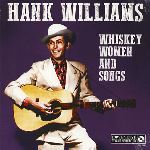
He worked for the rest of the war for a shipbuilding company in Mobile, Alabama, as well as singing in bars for soldiers. In 1943, Williams met Audrey Sheppard at a medicine show in Banks, Alabama. Williams and Sheppard lived and worked together in Mobile. Sheppard later told Williams that she wanted to move to Montgomery with him and start a band together and help him regain his radio show. The couple were married in 1944 at a Texaco Station in Andalusia, Alabama, by a justice of the peace. The marriage was declared illegal, since Sheppard's divorce from her previous husband did not comply with the legally required 60-day trial reconciliation.
In 1945, when he was back in Montgomery, Williams started to perform again for the WSFA radio station. He wrote songs weekly to perform during the shows. As a result of the new variety of his repertoire, Williams published his first songbook, Original Songs of Hank Williams. The book only listed lyrics, since its main purpose was to attract more audiences, though it is also possible that he did not want to pay for transcribing the notes. It included 10 songs: "Mother Is Gone", "Won't You Please Come Back", "My Darling Baby Girl" (with Audrey Sheppard), "Grandad's Musket", "I Just Wish I Could Forget", "Let's Turn Back the Years", "Honkey-Tonkey", "I Loved No One But You", "A Tramp on the Street", and "You'll Love Me Again". With Williams beginning to be recognized as a songwriter, Sheppard became his manager and occasionally accompanied him on duets in some of his live concerts.
On September 14, 1946, Williams auditioned for Nashville's Grand Ole Opry, but was rejected. After the failure of his audition, Williams and Audrey Sheppard attempted to interest the recently formed music publishing firm Acuff-Rose Music. Williams and his wife approached Fred Rose, the president of the company, during one of his habitual ping-pong games at WSM radio studios. Audrey Williams asked Rose if her husband could sing a song for him on that moment, Rose agreed, and he liked Williams' musical style. Rose signed Williams to a six-song contract, and leveraged this deal to sign Williams with Sterling Records. On December 11, 1946, in his first recording session, he recorded "Wealth Won't Save Your Soul", "Calling You", "Never Again (Will I Knock on Your Door)", and "When God Comes and Gathers His Jewels", which was misprinted as "When God Comes and Fathers His Jewels". The recordings "Never Again" and "Honky Tonkin'" became successful, and earned Williams the attention of MGM Records.
Williams signed with MGM Records in 1947 and released "Move It on Over"; considered an early example of rock and roll music, the song became a massive country hit. In 1948, he moved to Shreveport, Louisiana, and he joined the Louisiana Hayride, a radio show broadcast that propelled him into living rooms all over the Southeast appearing on weekend shows. Williams eventually started to host a show on KWKH and started touring across western Louisiana and eastern Texas, always returning on Saturdays for the weekly broadcast of the Hayride. After a few more moderate hits, in 1949 he released his version of the 1922 Cliff Friend and Irving Mills song "Lovesick Blues", made popular by Rex Griffin. Williams' version became a huge country hit; the song stayed at number one on the Billboard charts for four consecutive months, crossing over to mainstream audiences and gaining Williams a place in the Grand Ole Opry. On June 11, 1949, Williams made his debut at the Grand Ole Opry, where he became the first performer to receive six encores. He brought together Bob McNett (guitar), Hillous Butrum (bass), Jerry Rivers (fiddle) and Don Helms (steel guitar) to form the most famous version of the Drifting Cowboys, earning an estimated US$1,000 per show (equivalent to US$10,745.5 in 2020). That year Audrey Williams gave birth to Randall Hank Williams (Hank Williams Jr.). During 1949, he joined the first European tour of the Grand Ole Opry, performing in military bases in England, Germany and the Azores. Williams released seven hit songs after "Lovesick Blues", including "Wedding Bells", "Mind Your Own Business", "You're Gonna Change (Or I'm Gonna Leave)", and "My Bucket's Got a Hole in It".
In 1950, Williams began recording as "Luke the Drifter" for his religious-themed recordings, many of which are recitations rather than singing. Fearful that disc jockeys and jukebox operators would hesitate to accept these unusual recordings, Williams used this alias to avoid hurting the marketability of his name. Although the real identity of Luke the Drifter was supposed to be anonymous, Williams often performed part of the material of the recordings on stage. Most of the material was written by Williams himself, in some cases with the help of Fred Rose and his son Wesley. The songs depicted Luke the Drifter traveling around from place to place, narrating stories of different characters and philosophizing about life. Some of the compositions were accompanied by a pipe organ.
Around this time Williams released more hit songs, such as "My Son Calls Another Man Daddy", "They'll Never Take Her Love from Me", "Why Should We Try Anymore", "Nobody's Lonesome for Me", "Long Gone Lonesome Blues", "Why Don't You Love Me", "Moanin' the Blues", and "I Just Don't Like This Kind of Living". In 1951, "Dear John" became a hit, but it was the flip side, "Cold, Cold Heart", that became one of his most recognized songs. A pop cover version by Tony Bennett released the same year stayed on the charts for 27 weeks, peaking at number one.
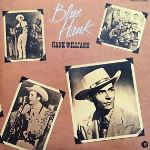
Williams' career reached a peak in the late summer of 1951 with his Hadacol tour of the U.S. with actor Bob Hope and other luminaries. On the weekend after the tour ended, Williams was photographed backstage at the Grand Ole Opry signing a motion picture deal with MGM. In October, Williams recorded a demo, "There's a Tear in My Beer" for a friend, "Big Bill Lister", who recorded it in the studio. The demo was later overdubbed by his son, Hank Williams Jr. On November 14, 1951, Williams flew to New York with his steel guitar player Don Helms where he appeared on television for the first time on The Perry Como Show. There he and Perry Como sang "Hey Good Lookin'". Photos but no existing footage remain of this appearance.
"Ramblin' Man" was written in 1951 by Williams. It was released as the B-side to the 1953 #1 hit "Take These Chains from My Heart", as well as to the 1976 re-release of "Why Don't You Love Me". It is also included on 40 Greatest Hits, a staple of his CD re-released material.
In November 1951, Williams suffered a fall during a hunting trip with his fiddler Jerry Rivers in Franklin, Tennessee. The fall reactivated his old back pains. He later started to consume painkillers, including morphine, and alcohol to help ease the pain. On May 21, he had been admitted to North Louisiana Sanitarium for the treatment of his alcoholism, leaving on May 24. On December 13, 1951, he had a spinal fusion at the Vanderbilt University Hospital, being released on December 24. During his recovery, he lived with his mother in Montgomery, and later moved to Nashville with Ray Price.
During the spring of 1952, Williams flew to New York with steel guitarist Don Helms, where he made two appearances with other Grand Ole Opry members on The Kate Smith Show. He sang "Cold, Cold Heart", "Hey Good Lookin''", "Glory Bound Train" and "I Saw the Light" with other cast members, and a duet, "I Can't Help It (If I'm Still in Love with You)" with Anita Carter. Footage remains of these appearances. That same year, had a brief extramarital affair with dancer Bobbie Jett, with whom he fathered a daughter, Jett Williams (born January 6, 1953, two days after his burial).
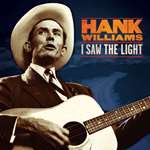
In June 1952, he recorded "Jambalaya (On the Bayou)", "Window Shopping", "Settin' the Woods on Fire", and "I'll Never Get out of this World Alive". Audrey Williams divorced him that year; the next day he recorded "You Win Again" and "I Won't be Home No More". Around this time, he met Billie Jean Jones, a girlfriend of country singer Faron Young, at the Grand Ole Opry. As a girl, Jones had lived down the street from Williams when he was with the Louisiana Hayride, and now Williams began to visit her frequently in Shreveport, causing him to miss many Grand Ole Opry appearances.
On August 11, 1952, Williams was dismissed from the Grand Ole Opry for habitual drunkenness and missing shows. He returned to Shreveport, Louisiana to perform on KWKH and WBAM shows and in the Louisiana Hayride, for which he toured again. His performances were acclaimed when he was sober, but despite the efforts of his work associates to get him to shows sober, his abuse of alcohol resulted in occasions when he did not appear or his performances were poor. In October 1952 he married Billie Jean Jones.
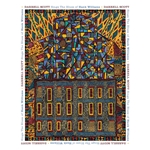
During his last recording session on September 23, 1952, Williams recorded "Kaw-Liga", along with "Your Cheatin' Heart", "Take These Chains from My Heart", and "I Could Never be Ashamed of You". Due to Williams' excesses, Fred Rose stopped working with him. By the end of 1952, Williams had started to suffer heart problems. He met Horace "Toby" Marshall in Oklahoma City, who said that he was a doctor. Marshall had been previously convicted for forgery, and had been paroled and released from the Oklahoma State Penitentiary in 1951. Among other fake titles, he said that he was a Doctor of Science. He purchased the DSC title for $25 from the Chicago School of Applied Science; in the diploma, he requested that the DSC be spelled out as "Doctor of Science and Psychology". Under the name of Dr. C. W. Lemon he prescribed Williams with amphetamines, Seconal, chloral hydrate, and morphine, which made his heart problems worse. His final concert was held in Austin, Texas at the Skyline Club on December 19.
Williams is widely recognized as "the King of Country Music", a title he shares with fellow artists Roy Acuff, Johnny Cash, and George Strait.
Alabama governor Gordon Persons officially proclaimed September 21 "Hank Williams Day". The first celebration, in 1954, featured the unveiling of a monument at the Cramton Bowl that was later placed at the gravesite of Williams. The ceremony featured Ferlin Husky interpreting "I Saw the Light".
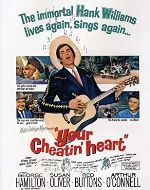
Williams had 11 number one country hits in his career ("Lovesick Blues", "Long Gone Lonesome Blues", "Why Don't You Love Me", "Moanin' the Blues", "Cold, Cold Heart", "Hey, Good Lookin'", "Jambalaya (On the Bayou)", "I'll Never Get Out of This World Alive", "Kaw-Liga", "Your Cheatin' Heart", and "Take These Chains from My Heart"), as well as many other top 10 hits.
On February 8, 1960, Williams' star was placed at 6400 Hollywood Boulevard on the Hollywood Walk of Fame. He was inducted into the Country Music Hall of Fame in 1961 and into the Alabama Music Hall of Fame in 1985. When Downbeat magazine took a poll the year after Williams' death, he was voted the most popular country and Western performer of all time—ahead of such giants as Jimmie Rodgers, Roy Acuff, Red Foley, and Ernest Tubb.
In 1964, Hank Williams was portrayed by George Hamilton in the film Your Cheatin' Heart.
In 1977, a national organization of CB truck drivers voted "Your Cheatin' Heart" as their favorite record of all time. In 1987, he was inducted in the Rock and Roll Hall of Fame under the category "Early Influence". He was ranked second in CMT's 40 Greatest Men of Country Music in 2003, behind only Johnny Cash who wrote the song "The Night Hank Williams Came To Town". His son, Hank Jr., was ranked on the same list.
In 2004, Rolling Stone ranked him number 74 on its list of the 100 Greatest Artists of All Time. Many artists of the 1950s and 1960s, including Elvis Presley, Bob Dylan, Tammy Wynette, David Houston, Jerry Lee Lewis, Merle Haggard, Gene Vincent, Carl Perkins, Ricky Nelson, and Conway Twitty recorded Williams' songs during their careers.
In 2011, Williams' 1949 MGM number one hit, "Lovesick Blues", was inducted into the Recording Academy Grammy Hall of Fame. The same year, Hank Williams: The Complete Mother's Best Recordings ...Plus! was honored with a Grammy nomination for Best Historical Album. In 1999, Williams was inducted into the Native American Music Hall of Fame. On April 12, 2010, the Pulitzer Prize Board awarded Williams a posthumous special citation that paid tribute to his "craftsmanship as a songwriter who expressed universal feelings with poignant simplicity and played a pivotal role in transforming country music into a major musical and cultural force in American life". Keeping his legacy alive, Williams' son, Hank Williams Jr., daughter Jett Williams, grandson Hank Williams III, and granddaughters Hilary Williams and Holly Williams are also country musicians.
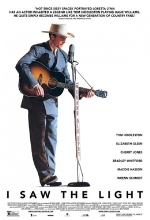
In 2006, a janitor of Sony/ATV Music Publishing found in a dumpster the unfinished lyrics written by Williams that had been found in his car the night he died. The worker claimed that she sold Williams' notes to a representative of the Honky-Tonk Hall of Fame and the Rock-N-Roll Roadshow. The janitor was accused of theft, but the charges were later dropped when a judge determined that her version of events was true. The unfinished lyrics were later returned to Sony/ATV, which handed them to Bob Dylan in 2008 to complete the songs for a new album. Ultimately, the completion of the album included recordings by Alan Jackson, Norah Jones, Jack White, Lucinda Williams, Vince Gill, Rodney Crowell, Patty Loveless, Levon Helm, Jakob Dylan, Sheryl Crow, and Merle Haggard. The album, named The Lost Notebooks of Hank Williams, was released on October 4, 2011.
Material recorded by Williams, originally intended for radio broadcasts to be played when he was on tour or for its distribution to radio stations nationwide, resurfaced throughout time. In 1993, a double-disc set of recordings of Williams for the Health & Happiness Show was released. Broadcast in 1949, the shows were recorded for the promotion of Hadacol. The set was re-released on Hank Williams: The Legend Begins in 2011. The album included unreleased songs. "Fan It" and "Alexander's Ragtime Band", recorded by Williams at age 15; the homemade recordings of him singing "Freight Train Blues", "New San Antonio Rose", "St. Louis Blues" and "Greenback Dollar" at age 18; and a recording for the 1951 March of Dimes. In May 2014, further radio recordings by Williams were released. The Garden Spot Programs, 1950, a series of publicity segments for plant nursery Naughton Farms originally aired in 1950. The recordings were found by collector George Gimarc at radio station KSIB in Creston, Iowa. Gimarc contacted Williams' daughter Jett, and Colin Escott, writer of a biography book on Williams. The material was restored and remastered by Michael Graves and released by Omnivore Recordings. The release won a Grammy Award for Best Historical Album.
British actor Tom Hiddleston portrayed Williams in the biopic I Saw the Light, based on Colin Escott's 1994 book Hank Williams: The Biography. Marc Abraham directed the film. The film was released in June 2016.

Text is available under the Creative Commons Attribution-ShareAlike License.
Date: October 2020.
Photo Credits:
(1ff) Hank Williams,
(9ff) Darrell Scott
(unknown/website).